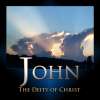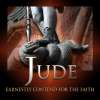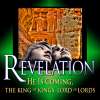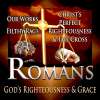New Testament StudiesThis category of studies includes all New Testament book studies. Note: All Completed Studies are sorted alphabetically by series and then in chronological order within the series. |

The outline of the Gospel of John is very simple. It begins with the prologue in the first eighteen verses which emphasizes the eternal Logos of God and how the logos, the Word, became flesh or incarnate. So John 1:1-18 is the introduction of the eternal logos of God incarnate; 1:19-12:50, the seven signs that testify that Jesus is the Messiah; chapters 13-20, the greatest sign: the crucifixion and resurrection of Jesus Christ; chapter 21 is the epilogue: the final statements related to Jesus as the Messiah.
Due to recording difficulties at the beginning, the first lesson was not recorded as well as various other lessons in this series. We apologize for these missing classes.
| To listen to this series as a podcast, copy and paste the following URL into your podcast software. www.deanbibleministries.org/podcasts/1998John.xml |

In the community of the first century, Christians faced two basic problems. The first was the problem of persecution against Christians and for the Jewish believers it would come from both the pagans in the Roman Empire as well as from certain Jews within the Jewish community who rejected Jesus’ claims to be the Messiah. The second area of conflict was within the church. Outside the church was the problem of persecution; inside the church was the problem of false doctrine.
Believers at that time lived within a pluralistic society in Rome where there were many different religious beliefs, a number of different religious systems that came from not only traditional Greco-Roman religions, but also from ideas that were synthesized from outside the Greco-Roman culture. So there was a challenge to Christians to stand firm in the faith, as the apostle Paul had warned them as well, and so the message of Jude is to contend for the faith.
Video DVDs of these lessons can be ordered here and here.
To view all video Bible studies in the Jude series, click here (Vimeo) or here (YouTube).
| To listen to this series as a podcast, copy and paste the following URL into your podcast software. www.deanbibleministries.org/podcasts/2012jude.xml |

Revelation is the climax of God's plan for history. Everything that begins in Genesis finds resolution in Revelation. In this final book of the New Testament we orient to God's plan for the future and fine tune the priority of living today in light of eternity. Revelation is unique in that it contains a promise of special blessing for those who teach it and for those who study it and apply the lessons learned. It's not just about the future, but contains vital teachings about our destiny that vitalize our thinking about today.
Starting with lesson number 28, video DVDs of these lessons can be ordered here or here.
To view all video Bible studies in the Revelation series, click here.
| To listen to this series as a podcast, copy and paste the following URL into your podcast software. www.deanbibleministries.org/podcasts/2004revelation.xml |

Romans has always been one of the favorite books of thoughtful Christians. In this epistle, the apostle Paul logically delineates the foundation and structure of Christian doctrine. The righteousness of God has been accurately identified as the central message of this epistle. How the righteousness of God relates to a human history of suffering, pain, and injustice, has been a frequent question through the ages. In Romans, Paul's answer shows that this question cannot be addressed in a sound bite or executive summary. The character of God, the volition of man, the history of man's rejection of God, must form the backdrop to a serious discussion on the righteousness of God. But an accurate understanding of the righteousness of God also reveals to us the magnificence of God's grace and His gracious plan of justification available freely to all mankind.
But this does not stop with simple justification, but also explains God's righteousness in the life of the believer after salvation and how God's righteousness is vindicated in history as indicated through His faithful love for Israel.
Video DVDs of these lessons can be ordered here and here.
To view all video Bible studies in the Romans series, click here.
| To listen to this series as a podcast, copy and paste the following URL into your podcast software. www.deanbibleministries.org/podcasts/2010romans.xml |